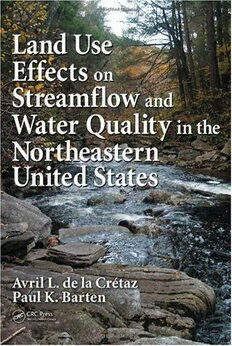
Land Use Effects on Streamflow and Water Quality in the Northeastern United States PDF
342 Pages·2007·5.569 MB·English
Most books are stored in the elastic cloud where traffic is expensive. For this reason, we have a limit on daily download.
Preview Land Use Effects on Streamflow and Water Quality in the Northeastern United States
Description:
Filling a long-standing need for a desk reference that synthesizes current research, Land Use Effects on Streamflow and Water Quality in the Northeastern United States reviews and discusses the impact of forest management, agriculture, and urbanization. The book provides a gateway to the diverse scientific literature that is urgently needed to understand and solve ubiquitous watershed management problems. The authors use an in-depth approach that focuses on the science behind sound management principles and practices. The book begins with a summary of the scientific principles and processes that define and govern the interactions between activities on land and conditions in streams, lakes, and estuaries. Building on these principles, later chapters progress from basic science to small-scale, controlled field experiments to landscape-scale studies and their watershed management implications. This nested format parallels the development of watershed management projects and solutions. The deliberate integration of land use history, ecology, hydrology, chemistry, and resource management avoids the artificial separation of inter-related watershed characteristics and tracks causes and effects over realistic time scales. The authors present the hydrologic and water quality principles on which to construct management plans for water supply watersheds across a wide range of sizes, configurations, and time scales. Rigorously reviewed by a distinguished panel of scientists and watershed managers, the book benefits from their collective experience across the full range of watershed science and management. It provides a diverse audience with the opportunity to update and expand their knowledge in critical areas of watershed science and management.
See more
The list of books you might like
Most books are stored in the elastic cloud where traffic is expensive. For this reason, we have a limit on daily download.
